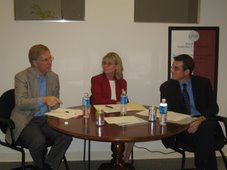by Matthew Worner
The Inspector General Act of 1978 created independent audit and investigation units in the executive branch and independent federal government agencies. Today, there are 64 statutory inspectors general (IGs). The mandate of the IGs is to:
- Conduct and supervise independent and objective audits and investigations relating to agency programs and operations;
- Promote economy, effectiveness and efficiency within the agency;
- Prevent and detect crime, fraud, waste and abuse in agency programs and operations;
- Review and make recommendations regarding existing and proposed legislation and Regulations relating to agency programs and operations;
- Keep the agency head and the Congress fully and currently informed of problems in agency programs and operations.
According to the Act, the individuals are to be “appointed on the basis of their personal integrity and expertise in accounting, auditing, financial analysis, law, management analysis, public administration, or investigations.” IGs serving at the Cabinet-level departments and major sub-Cabinet agencies are nominated by the President and confirmed by the Senate. IGs at independent agencies, corporations, and other designated Federal entities are appointed by the heads of those entities.
Due to scandals at a number of federal agency IGs, including the Departments of State (where investigation cover-ups are alleged) and Commerce, the General Services Administration , NASA, and many other IGs (I sound like an auctioneer), the Improving Government Accountability Act has been approved 404 to 11 by the House of Representatives to protect IGs from political retribution.. Under the legislation, IGs, who now serve at the pleasure of their appointing authorities (the President or the head of the Agency), could be fired before the end of the terms only for cause, based on such factors as malfeasance, permanent disability, inefficiency, neglect of duty, or conviction of a felony. The bill would also grant IGs fixed seven year terms and authorize IGs to send their budget requests directly to Congress to deter officials in their respective agencies from slashing their funding in retaliation for unfavorable audits. Finally, the bill would create an independent Council of the Inspectors General on Integrity and Efficiency in the executive branch.
The Bush Administration, however, has opposed the legislation on the basis of “grave constitutional grounds.” Administration officials also disagree with the legislation because they feel it would allow IGs to circumvent the president’s control over determining the annual federal budget request to Congress. Finally, the Administration also disagrees with provisions that would establish the independent Council of the Inspectors General on Integrity and Efficiency because a similar council already exists. The Administration reported that “statutory codification of such a council would impede the President’s ability to react swiftly and effectively to problems with IGs or with the Council itself.”
One can assume that the Administration feels that IGs are officials that serve at the pleasure of the President (this Administration, in particular, cherishes its executive power). While the Administration does not define their “grave constitutional concerns” in their statement of administration policy, one can assume that it feels that the Congress is trying “to snatch some of its executive power.” Congress, on the other hand, does have the right to legislate and take other appropriate actions when it sees that government operations, including the IG function, need improvement (considering the number of IG-related scandals, the word “improvement” might be an understatement). To them, it looks good if “they are doing something about the problem.” Where do I stand on this legislation? Implementation of this legislation could cause the IGs to become very, very partisan political tools government. If the IGs, for example, do not do the “right” or enough of the right investigations or audits, they could be fired. How is an IG’s inefficiency or neglect of duty defined? Vague, indeed!! The President does, however, have a right to trusted group of advisors. The Comptroller General, for example, reports directly to Congress and the President (and agency heads) deserves the same relationship with its IGs. Former IG of the Departments of Commerce and State, Sherman Funk, has referred to the OIGs dual reporting relationships to Congress and the executive branch as that of “straddling a barbed wire fence”. John Rohr, distinguished Virginia Tech public administration and policy professor and ethics scholar, stated that, “The tension is at once personal and institutional. Personal because you feel the discomfort of the barded wire; institutional because the law of the land has put you there.” I think the fence may become very bloody if this legislation is passed by the Senate and signed by the President. Hopefully the Senate can improve on some of the vague areas of the legislation; however, I predict a veto by the President if the Senate does not pass the legislation by two-thirds majority. Where do you stand? Give me your thoughts!!
AND GO VIRGINIA TECH HOKIES… BEAT THE GEORGIA TECH YELLOW JACKETS!!! November 1, 2007 at 7:30 PM on ESPN
http://www.hokiesports.com/football/notes/11012007.pdf
[1] http://www.ignet.gov/index.html (Accessed October 29, 2007) [2]http://www4.law.cornell.edu/uscode/html/uscode05a/usc_sec_05a_01000002----000-.html (Accessed October 29, 2007) [3]http://www4.law.cornell.edu/uscode/html/uscode05a/usc_sec_05a_01000003----000-.html October 29, 2007) (Accessed
[4] http://www.ignet.gov/pande/mission1.html (Accessed October 29, 2007) [5] http://oversight.house.gov/documents/20070928101631.pdf (Accessed October 31, 2007)
[6] http://oversight.house.gov/documents/20070918105806.pdf (Accessed October 31, 2007)
[7] http://www.govexec.com/story_page.cfm?articleid=38345&ref=rellink (Accessed October 31, 2007)
[8] http://www.govexec.com/story_page.cfm?articleid=38196&ref=rellink (Accessed October 31, 2007)
[9] http://www.govexec.com/story_page.cfm?articleid=38161&ref=rellink (Accessed October 31, 2007)
[10] http://www.govexec.com/story_page.cfm?filepath=/dailyfed/1007/102907cdam1.htm (Accessed October 31, 2007)
[11] http://www.govexec.com/story_page.cfm?articleid=38443&sid=61 (Accessed October 31, 2007)
[12] http://www.govexec.com/dailyfed/0507/050407m1.htm (Accessed October 31, 2007)
[13] http://www.govexec.com/pdfs/Grassley102006.pdf (Accessed October 31, 2007)
[14] http://www.govexec.com/story_page.cfm?articleid=35599&ref=rellink (Accessed October 31, 2007)
[15] http://www.govexec.com/story_page.cfm?articleid=35650&ref=rellink (Accessed October 31, 2007) [16]http://www.washingtonpost.com/wp-dyn/content/article/2006/12/01/AR2006120101645_pf.html (Accessed October 31, 2007)
[17] http://www.govexec.com/dailyfed/0607/060807m1.htm (October 31, 2007)
[18]The Committee on Government Oversight and Reform has presented an accompanying report in support of the legislation, which also addresses the various IG scandals. The report is at: http://frwebgate.access.gpo.gov/cgi-bin/getdoc.cgi?dbname=110_cong_reports&docid=f:hr354.110.pdf (Accessed October 29, 2007), pages 9-10.
[19]http://frwebgate.access.gpo.gov/cgi-bin/getdoc.cgi?dbname=110_cong_bills&docid=f:h928rfs.txt.pdf (Accessed October 31, 2007)
[20] http://www.whitehouse.gov/omb/legislative/sap/110-1/hr928sap-r.pdf (Accessed October 31, 2007)
21] Light, Paul C. 1993. Monitoring government: inspectors general and the search for accountability. Washington, DC: The Brookings Institution.
[22] Rohr, John A. 1998. Public service, ethics, and constitutional practice. Lawrence, KS: The University of Kansas Press.







